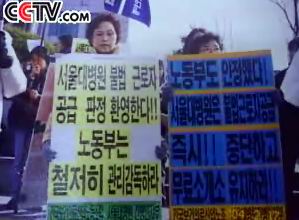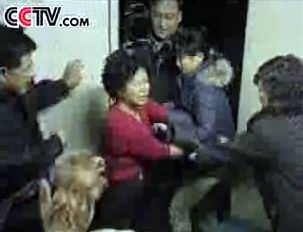Source: CCTV.com
02-08-2007 18:25
Women in South Korea who work on a freelance basis or as non-permanent employees, are seeking to protect their legitimate rights by establishing a labor union. In today's Working Asia series, Kim Young Sang, from EBS Korea, explains this long and difficult struggle by South Korean women.
In India, women work twice as many hours as men, while also having to do the household chores. Join us for tomorrow's working Asia series to see what Indian women are doing to improve their situation.
 |
At the Intensive Care Unit of a major university hospital, special care provider Ilsun Kim skillfully tends to the needs of a patient. For 24 hours straight, Ilsun is in charge of everything, from nursing duties to everyday chores.
Two years ago, that hospital suddenly closed their two free special care provider agencies that it was operating. Just like that, eighty special care providers were out of work. The hospital claimed it didn't want to handle complaints about some of the workers.
J.N.Choi, special care provider, said "We realized that in order to protect our rights, we had to be recognized as regular workers. And we started fighting."
 |
| K.J.Jeoung, labor union manager |
These special care providers were categorized as free-lance employees to whom work was outsourced. Kumja Chong, who has worked for ten years as a special care provider, looked into the matter, and in 2001 founded a labor union.
K.J.Jeoung, labor union manager, said "We thought it best to not let anyone know about the union, not even our families. If one of us got fired, the element of surprise would give us power. So nobody else knew."
When the hospital decided to close the free introduction agency, the special service providers were working hard, even though they were not officially considered employees. They chose to fight an uphill battle instead of compromising. After that long and difficult fight, they gained more than just their jobs back.
 |
Special care provider J.N.Choi said "Before we became a union, we were afraid of the registered nurses. We were afraid that nitpicking head nurses would give us bad reviews. But not anymore. We now work without such fear."
The hospital's labor union has been a strong supporter of the special care providers'nascent union. It has negotiated with management on behalf of so-called "non-permanent employees," while discussing policy issues and how to deal with governmental authorities.
K.J.Jeoung said "We know where our future is now. Now we can focus on our jobs and do them well. Before the labor union began, food delivery workers, special care providers, and custodial staff didn't even have job titles and were just disregarded."
Even if not recognized by law, if someone labors, then he or she is a laborer deserving dignity.
Lawyer D.S.Kwun said "When you look at them, these so-called freelance, non-permanent jobs are no different from regular jobs. But the law says they are not full-fledged workers, and so they are deprived of Korean labor's Three Primary Rights and the ability to protect those rights."
 |
200 of these non-regular workers gathered in front of the National Assembly Building. In addition to her special care provider duties, Kumja Chong is a typical homemaker making ends meet. They were all unilaterally fired from the hospital, but many came back to work for themselves. Kumja Chong, however, wants something bigger. "This is not just a fight for the non-regular, so-called freelance employees. This is also for the regular employees, and your children when they grow up. We want to build a hopeful society free of pain like this. We will fight this to the end."
But they are not rushing to an easy compromise. They know that by gathering together the power of the common people, they will become a major force.
Editor:Du Xiaodan
